Financial Management System Analysis and Recommendation for Hospitals
VerifiedAdded on 2022/11/16
|8
|1931
|352
Case Study
AI Summary
This assignment analyzes the implementation of a financial management system in the context of King Feisal Hospital. It begins by recommending financial accounting as the most suitable system, emphasizing its ability to streamline financial processes, ensure transparency, and facilitate informed decision-making. The paper explores the selection process, highlighting the importance of aligning the system with the hospital's mission and goals. It then assesses the system's impact on healthcare costs, quality, and access, arguing that implementation will likely improve healthcare outcomes without significantly increasing costs. The analysis also examines the potential benefits, such as improved financial planning and transparency, while acknowledging the associated costs of implementation. The conclusion reinforces the recommendation for financial accounting, underscoring its feasibility and importance for the hospital's financial health and ability to deliver quality healthcare services. The paper also references relevant literature to support its arguments.
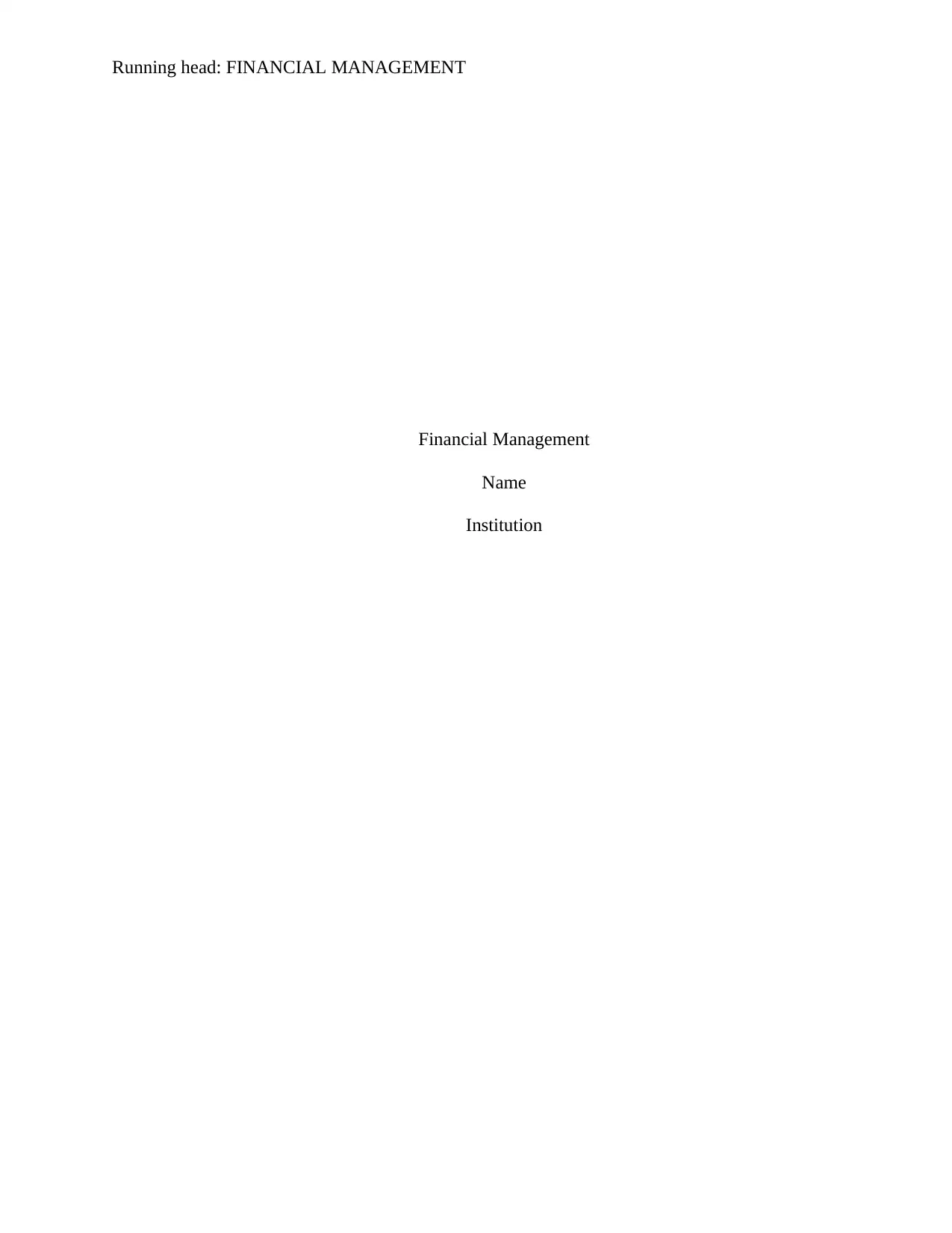
Running head: FINANCIAL MANAGEMENT
Financial Management
Name
Institution
Financial Management
Name
Institution
Paraphrase This Document
Need a fresh take? Get an instant paraphrase of this document with our AI Paraphraser
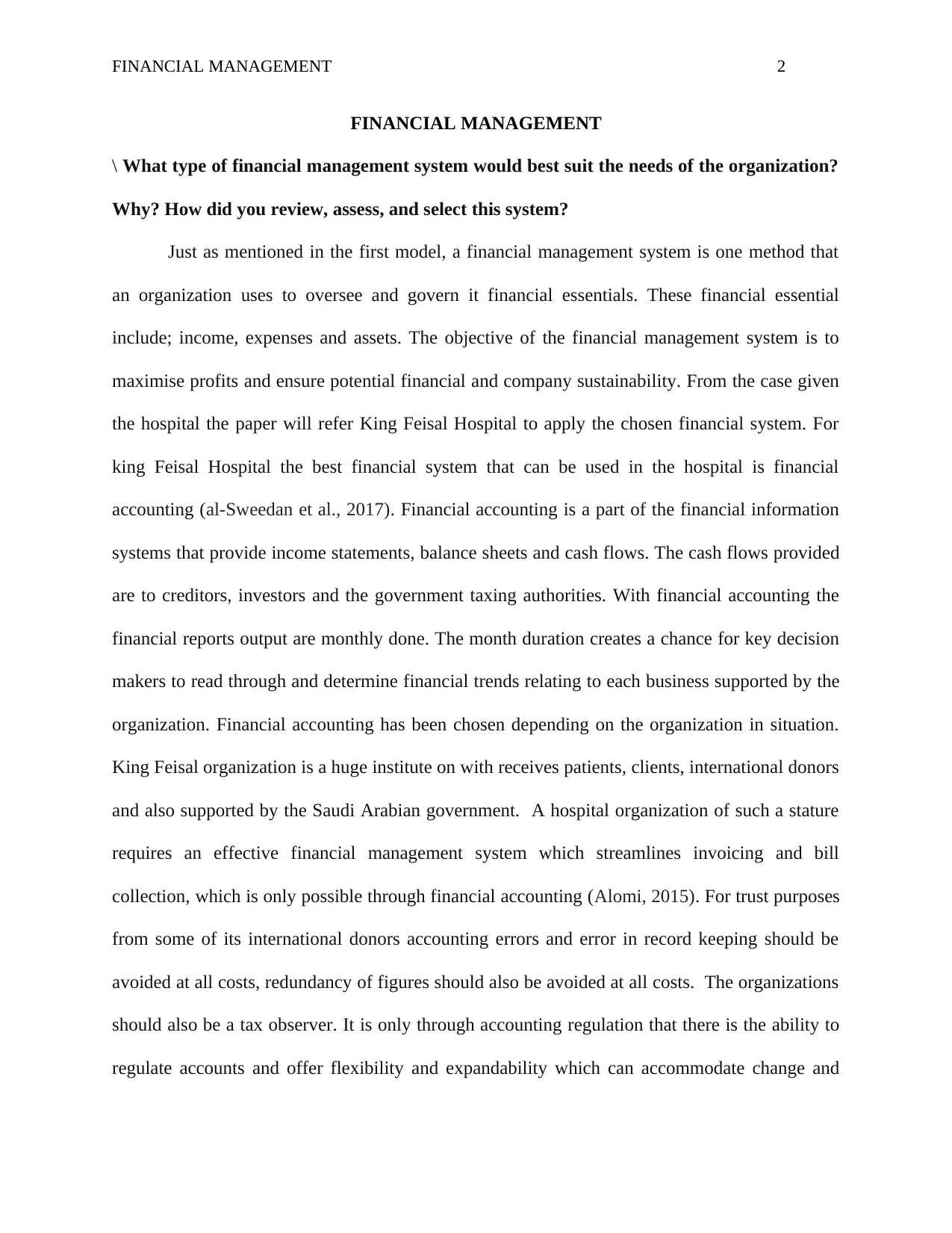
FINANCIAL MANAGEMENT 2
FINANCIAL MANAGEMENT
\ What type of financial management system would best suit the needs of the organization?
Why? How did you review, assess, and select this system?
Just as mentioned in the first model, a financial management system is one method that
an organization uses to oversee and govern it financial essentials. These financial essential
include; income, expenses and assets. The objective of the financial management system is to
maximise profits and ensure potential financial and company sustainability. From the case given
the hospital the paper will refer King Feisal Hospital to apply the chosen financial system. For
king Feisal Hospital the best financial system that can be used in the hospital is financial
accounting (al-Sweedan et al., 2017). Financial accounting is a part of the financial information
systems that provide income statements, balance sheets and cash flows. The cash flows provided
are to creditors, investors and the government taxing authorities. With financial accounting the
financial reports output are monthly done. The month duration creates a chance for key decision
makers to read through and determine financial trends relating to each business supported by the
organization. Financial accounting has been chosen depending on the organization in situation.
King Feisal organization is a huge institute on with receives patients, clients, international donors
and also supported by the Saudi Arabian government. A hospital organization of such a stature
requires an effective financial management system which streamlines invoicing and bill
collection, which is only possible through financial accounting (Alomi, 2015). For trust purposes
from some of its international donors accounting errors and error in record keeping should be
avoided at all costs, redundancy of figures should also be avoided at all costs. The organizations
should also be a tax observer. It is only through accounting regulation that there is the ability to
regulate accounts and offer flexibility and expandability which can accommodate change and
FINANCIAL MANAGEMENT
\ What type of financial management system would best suit the needs of the organization?
Why? How did you review, assess, and select this system?
Just as mentioned in the first model, a financial management system is one method that
an organization uses to oversee and govern it financial essentials. These financial essential
include; income, expenses and assets. The objective of the financial management system is to
maximise profits and ensure potential financial and company sustainability. From the case given
the hospital the paper will refer King Feisal Hospital to apply the chosen financial system. For
king Feisal Hospital the best financial system that can be used in the hospital is financial
accounting (al-Sweedan et al., 2017). Financial accounting is a part of the financial information
systems that provide income statements, balance sheets and cash flows. The cash flows provided
are to creditors, investors and the government taxing authorities. With financial accounting the
financial reports output are monthly done. The month duration creates a chance for key decision
makers to read through and determine financial trends relating to each business supported by the
organization. Financial accounting has been chosen depending on the organization in situation.
King Feisal organization is a huge institute on with receives patients, clients, international donors
and also supported by the Saudi Arabian government. A hospital organization of such a stature
requires an effective financial management system which streamlines invoicing and bill
collection, which is only possible through financial accounting (Alomi, 2015). For trust purposes
from some of its international donors accounting errors and error in record keeping should be
avoided at all costs, redundancy of figures should also be avoided at all costs. The organizations
should also be a tax observer. It is only through accounting regulation that there is the ability to
regulate accounts and offer flexibility and expandability which can accommodate change and
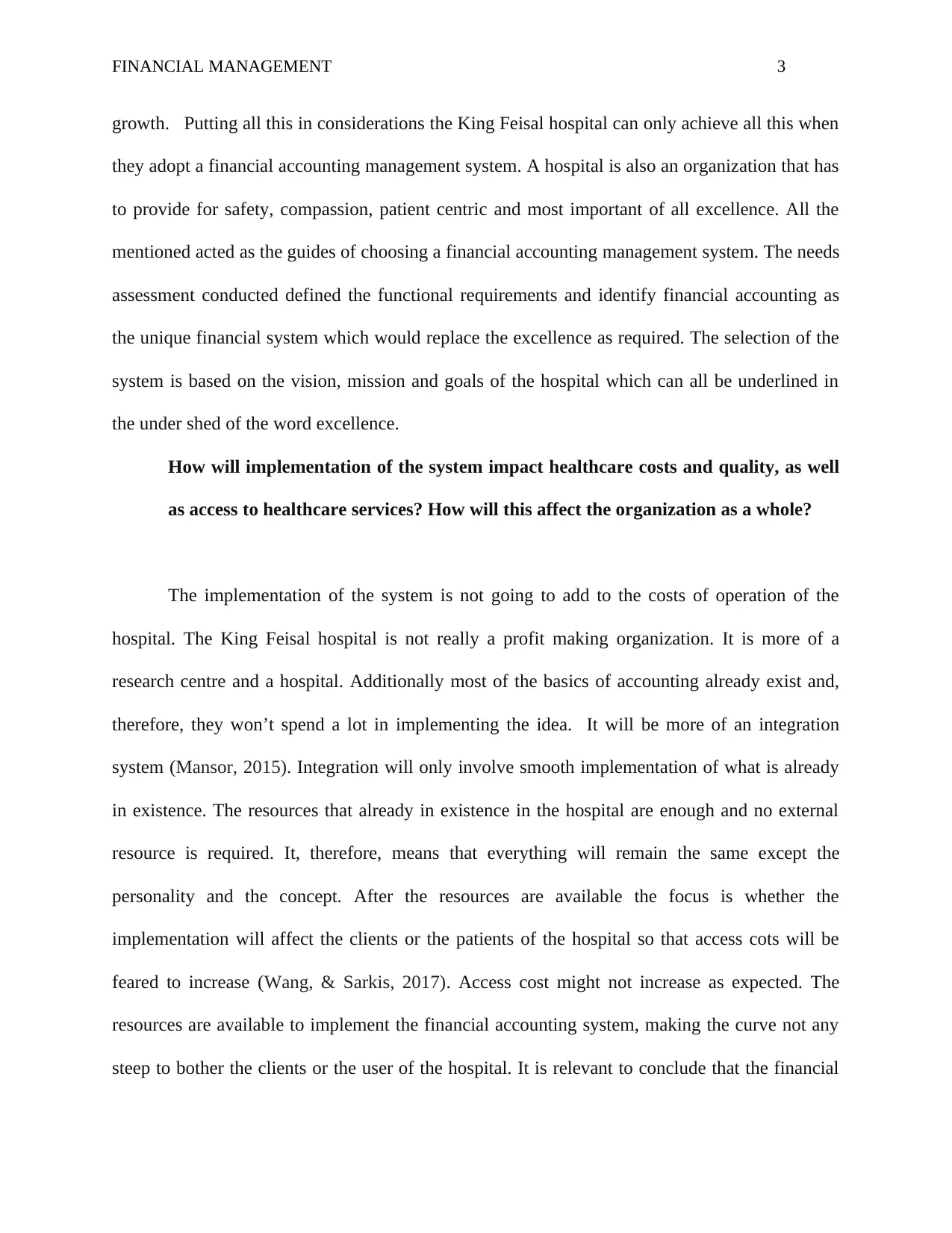
FINANCIAL MANAGEMENT 3
growth. Putting all this in considerations the King Feisal hospital can only achieve all this when
they adopt a financial accounting management system. A hospital is also an organization that has
to provide for safety, compassion, patient centric and most important of all excellence. All the
mentioned acted as the guides of choosing a financial accounting management system. The needs
assessment conducted defined the functional requirements and identify financial accounting as
the unique financial system which would replace the excellence as required. The selection of the
system is based on the vision, mission and goals of the hospital which can all be underlined in
the under shed of the word excellence.
How will implementation of the system impact healthcare costs and quality, as well
as access to healthcare services? How will this affect the organization as a whole?
The implementation of the system is not going to add to the costs of operation of the
hospital. The King Feisal hospital is not really a profit making organization. It is more of a
research centre and a hospital. Additionally most of the basics of accounting already exist and,
therefore, they won’t spend a lot in implementing the idea. It will be more of an integration
system (Mansor, 2015). Integration will only involve smooth implementation of what is already
in existence. The resources that already in existence in the hospital are enough and no external
resource is required. It, therefore, means that everything will remain the same except the
personality and the concept. After the resources are available the focus is whether the
implementation will affect the clients or the patients of the hospital so that access cots will be
feared to increase (Wang, & Sarkis, 2017). Access cost might not increase as expected. The
resources are available to implement the financial accounting system, making the curve not any
steep to bother the clients or the user of the hospital. It is relevant to conclude that the financial
growth. Putting all this in considerations the King Feisal hospital can only achieve all this when
they adopt a financial accounting management system. A hospital is also an organization that has
to provide for safety, compassion, patient centric and most important of all excellence. All the
mentioned acted as the guides of choosing a financial accounting management system. The needs
assessment conducted defined the functional requirements and identify financial accounting as
the unique financial system which would replace the excellence as required. The selection of the
system is based on the vision, mission and goals of the hospital which can all be underlined in
the under shed of the word excellence.
How will implementation of the system impact healthcare costs and quality, as well
as access to healthcare services? How will this affect the organization as a whole?
The implementation of the system is not going to add to the costs of operation of the
hospital. The King Feisal hospital is not really a profit making organization. It is more of a
research centre and a hospital. Additionally most of the basics of accounting already exist and,
therefore, they won’t spend a lot in implementing the idea. It will be more of an integration
system (Mansor, 2015). Integration will only involve smooth implementation of what is already
in existence. The resources that already in existence in the hospital are enough and no external
resource is required. It, therefore, means that everything will remain the same except the
personality and the concept. After the resources are available the focus is whether the
implementation will affect the clients or the patients of the hospital so that access cots will be
feared to increase (Wang, & Sarkis, 2017). Access cost might not increase as expected. The
resources are available to implement the financial accounting system, making the curve not any
steep to bother the clients or the user of the hospital. It is relevant to conclude that the financial
⊘ This is a preview!⊘
Do you want full access?
Subscribe today to unlock all pages.

Trusted by 1+ million students worldwide
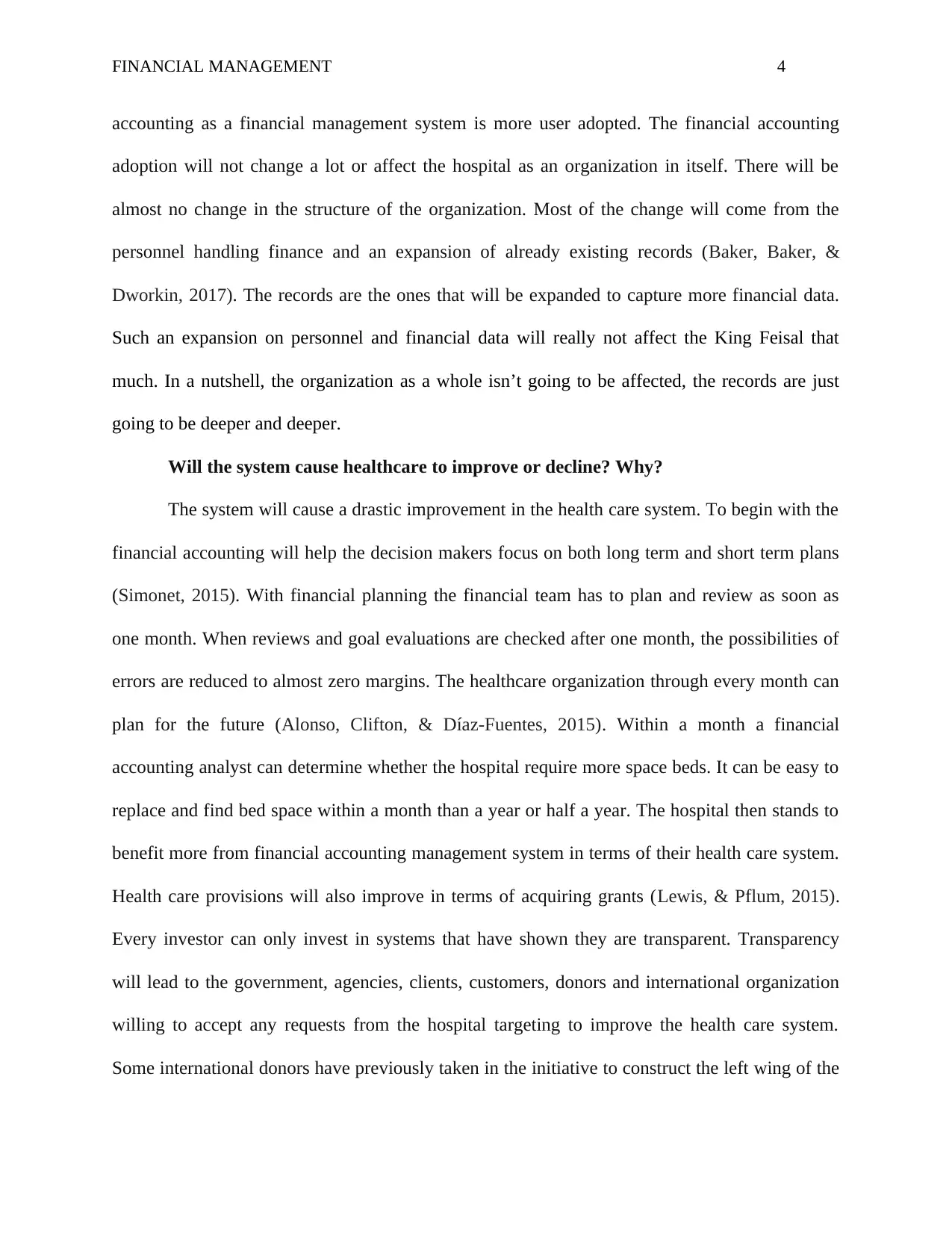
FINANCIAL MANAGEMENT 4
accounting as a financial management system is more user adopted. The financial accounting
adoption will not change a lot or affect the hospital as an organization in itself. There will be
almost no change in the structure of the organization. Most of the change will come from the
personnel handling finance and an expansion of already existing records (Baker, Baker, &
Dworkin, 2017). The records are the ones that will be expanded to capture more financial data.
Such an expansion on personnel and financial data will really not affect the King Feisal that
much. In a nutshell, the organization as a whole isn’t going to be affected, the records are just
going to be deeper and deeper.
Will the system cause healthcare to improve or decline? Why?
The system will cause a drastic improvement in the health care system. To begin with the
financial accounting will help the decision makers focus on both long term and short term plans
(Simonet, 2015). With financial planning the financial team has to plan and review as soon as
one month. When reviews and goal evaluations are checked after one month, the possibilities of
errors are reduced to almost zero margins. The healthcare organization through every month can
plan for the future (Alonso, Clifton, & Díaz-Fuentes, 2015). Within a month a financial
accounting analyst can determine whether the hospital require more space beds. It can be easy to
replace and find bed space within a month than a year or half a year. The hospital then stands to
benefit more from financial accounting management system in terms of their health care system.
Health care provisions will also improve in terms of acquiring grants (Lewis, & Pflum, 2015).
Every investor can only invest in systems that have shown they are transparent. Transparency
will lead to the government, agencies, clients, customers, donors and international organization
willing to accept any requests from the hospital targeting to improve the health care system.
Some international donors have previously taken in the initiative to construct the left wing of the
accounting as a financial management system is more user adopted. The financial accounting
adoption will not change a lot or affect the hospital as an organization in itself. There will be
almost no change in the structure of the organization. Most of the change will come from the
personnel handling finance and an expansion of already existing records (Baker, Baker, &
Dworkin, 2017). The records are the ones that will be expanded to capture more financial data.
Such an expansion on personnel and financial data will really not affect the King Feisal that
much. In a nutshell, the organization as a whole isn’t going to be affected, the records are just
going to be deeper and deeper.
Will the system cause healthcare to improve or decline? Why?
The system will cause a drastic improvement in the health care system. To begin with the
financial accounting will help the decision makers focus on both long term and short term plans
(Simonet, 2015). With financial planning the financial team has to plan and review as soon as
one month. When reviews and goal evaluations are checked after one month, the possibilities of
errors are reduced to almost zero margins. The healthcare organization through every month can
plan for the future (Alonso, Clifton, & Díaz-Fuentes, 2015). Within a month a financial
accounting analyst can determine whether the hospital require more space beds. It can be easy to
replace and find bed space within a month than a year or half a year. The hospital then stands to
benefit more from financial accounting management system in terms of their health care system.
Health care provisions will also improve in terms of acquiring grants (Lewis, & Pflum, 2015).
Every investor can only invest in systems that have shown they are transparent. Transparency
will lead to the government, agencies, clients, customers, donors and international organization
willing to accept any requests from the hospital targeting to improve the health care system.
Some international donors have previously taken in the initiative to construct the left wing of the
Paraphrase This Document
Need a fresh take? Get an instant paraphrase of this document with our AI Paraphraser
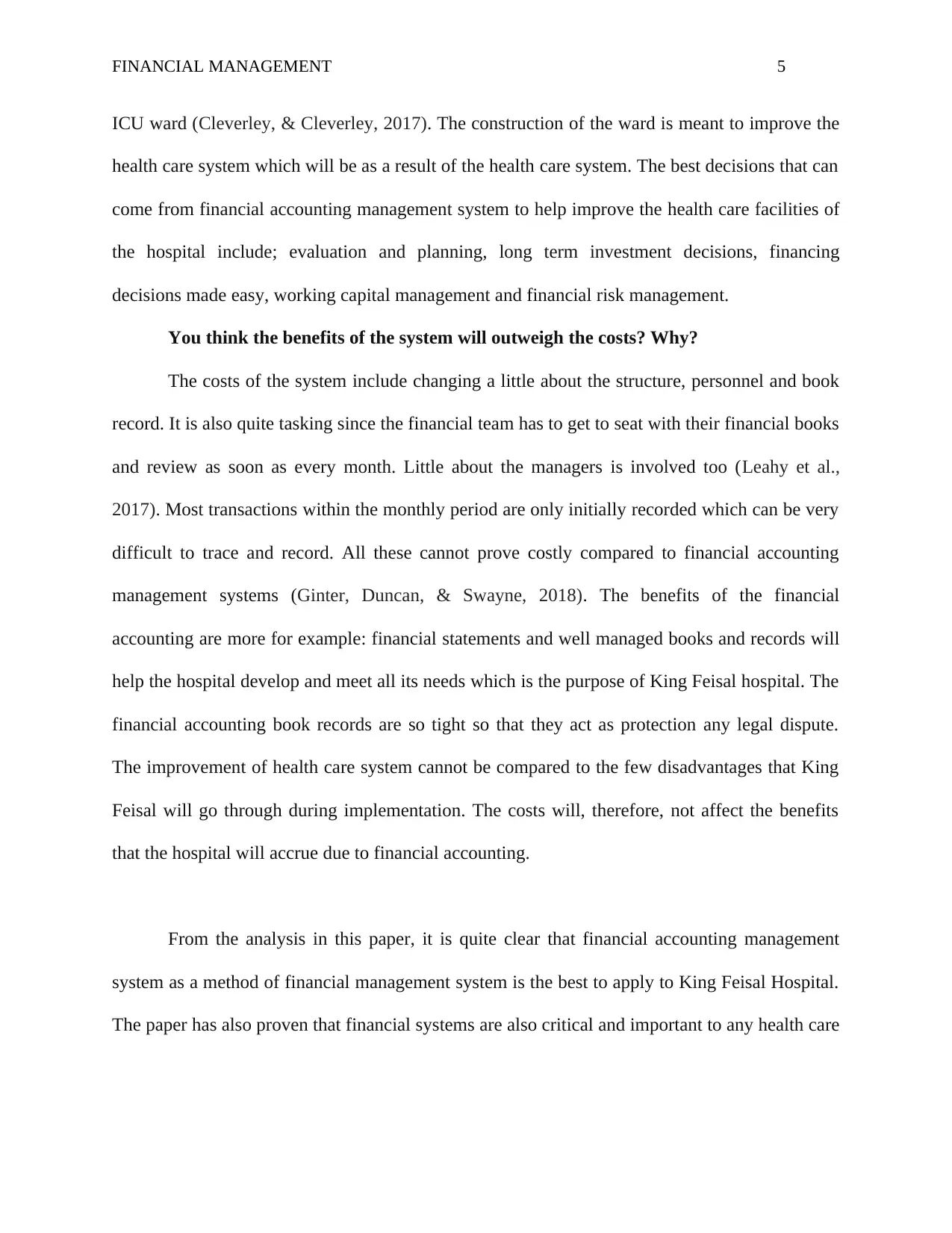
FINANCIAL MANAGEMENT 5
ICU ward (Cleverley, & Cleverley, 2017). The construction of the ward is meant to improve the
health care system which will be as a result of the health care system. The best decisions that can
come from financial accounting management system to help improve the health care facilities of
the hospital include; evaluation and planning, long term investment decisions, financing
decisions made easy, working capital management and financial risk management.
You think the benefits of the system will outweigh the costs? Why?
The costs of the system include changing a little about the structure, personnel and book
record. It is also quite tasking since the financial team has to get to seat with their financial books
and review as soon as every month. Little about the managers is involved too (Leahy et al.,
2017). Most transactions within the monthly period are only initially recorded which can be very
difficult to trace and record. All these cannot prove costly compared to financial accounting
management systems (Ginter, Duncan, & Swayne, 2018). The benefits of the financial
accounting are more for example: financial statements and well managed books and records will
help the hospital develop and meet all its needs which is the purpose of King Feisal hospital. The
financial accounting book records are so tight so that they act as protection any legal dispute.
The improvement of health care system cannot be compared to the few disadvantages that King
Feisal will go through during implementation. The costs will, therefore, not affect the benefits
that the hospital will accrue due to financial accounting.
From the analysis in this paper, it is quite clear that financial accounting management
system as a method of financial management system is the best to apply to King Feisal Hospital.
The paper has also proven that financial systems are also critical and important to any health care
ICU ward (Cleverley, & Cleverley, 2017). The construction of the ward is meant to improve the
health care system which will be as a result of the health care system. The best decisions that can
come from financial accounting management system to help improve the health care facilities of
the hospital include; evaluation and planning, long term investment decisions, financing
decisions made easy, working capital management and financial risk management.
You think the benefits of the system will outweigh the costs? Why?
The costs of the system include changing a little about the structure, personnel and book
record. It is also quite tasking since the financial team has to get to seat with their financial books
and review as soon as every month. Little about the managers is involved too (Leahy et al.,
2017). Most transactions within the monthly period are only initially recorded which can be very
difficult to trace and record. All these cannot prove costly compared to financial accounting
management systems (Ginter, Duncan, & Swayne, 2018). The benefits of the financial
accounting are more for example: financial statements and well managed books and records will
help the hospital develop and meet all its needs which is the purpose of King Feisal hospital. The
financial accounting book records are so tight so that they act as protection any legal dispute.
The improvement of health care system cannot be compared to the few disadvantages that King
Feisal will go through during implementation. The costs will, therefore, not affect the benefits
that the hospital will accrue due to financial accounting.
From the analysis in this paper, it is quite clear that financial accounting management
system as a method of financial management system is the best to apply to King Feisal Hospital.
The paper has also proven that financial systems are also critical and important to any health care
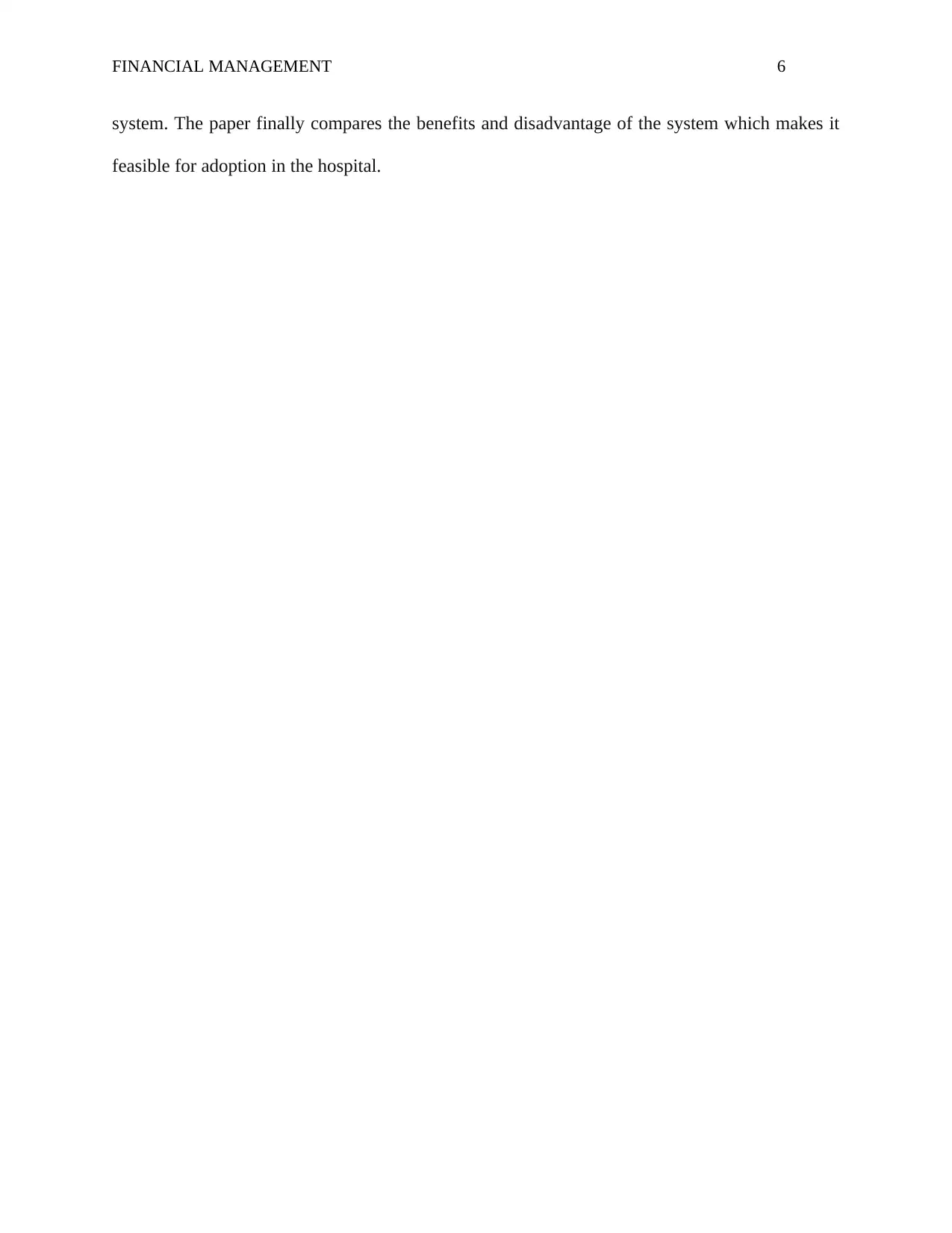
FINANCIAL MANAGEMENT 6
system. The paper finally compares the benefits and disadvantage of the system which makes it
feasible for adoption in the hospital.
system. The paper finally compares the benefits and disadvantage of the system which makes it
feasible for adoption in the hospital.
⊘ This is a preview!⊘
Do you want full access?
Subscribe today to unlock all pages.

Trusted by 1+ million students worldwide
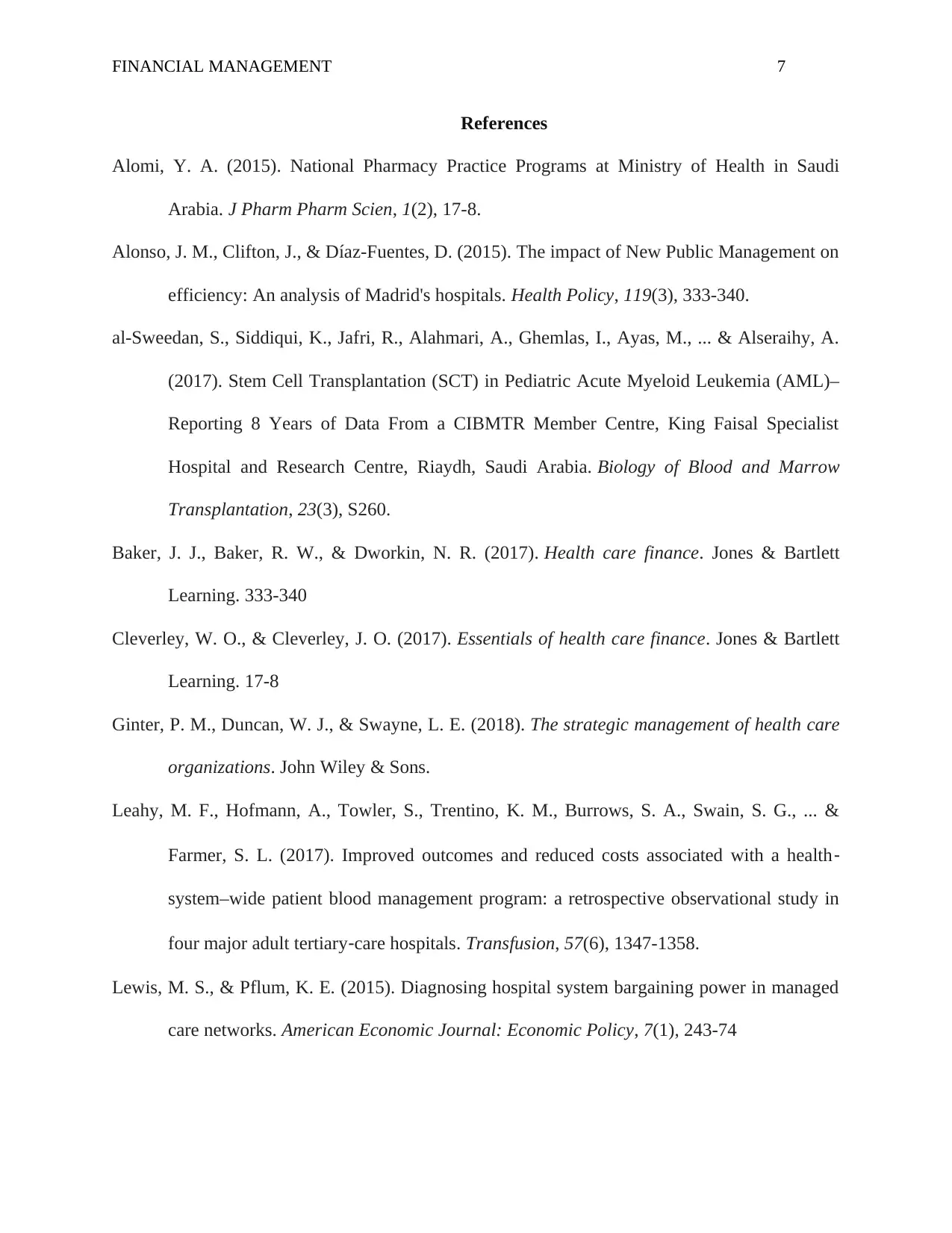
FINANCIAL MANAGEMENT 7
References
Alomi, Y. A. (2015). National Pharmacy Practice Programs at Ministry of Health in Saudi
Arabia. J Pharm Pharm Scien, 1(2), 17-8.
Alonso, J. M., Clifton, J., & Díaz-Fuentes, D. (2015). The impact of New Public Management on
efficiency: An analysis of Madrid's hospitals. Health Policy, 119(3), 333-340.
al-Sweedan, S., Siddiqui, K., Jafri, R., Alahmari, A., Ghemlas, I., Ayas, M., ... & Alseraihy, A.
(2017). Stem Cell Transplantation (SCT) in Pediatric Acute Myeloid Leukemia (AML)–
Reporting 8 Years of Data From a CIBMTR Member Centre, King Faisal Specialist
Hospital and Research Centre, Riaydh, Saudi Arabia. Biology of Blood and Marrow
Transplantation, 23(3), S260.
Baker, J. J., Baker, R. W., & Dworkin, N. R. (2017). Health care finance. Jones & Bartlett
Learning. 333-340
Cleverley, W. O., & Cleverley, J. O. (2017). Essentials of health care finance. Jones & Bartlett
Learning. 17-8
Ginter, P. M., Duncan, W. J., & Swayne, L. E. (2018). The strategic management of health care
organizations. John Wiley & Sons.
Leahy, M. F., Hofmann, A., Towler, S., Trentino, K. M., Burrows, S. A., Swain, S. G., ... &
Farmer, S. L. (2017). Improved outcomes and reduced costs associated with a health‐
system–wide patient blood management program: a retrospective observational study in
four major adult tertiary‐care hospitals. Transfusion, 57(6), 1347-1358.
Lewis, M. S., & Pflum, K. E. (2015). Diagnosing hospital system bargaining power in managed
care networks. American Economic Journal: Economic Policy, 7(1), 243-74
References
Alomi, Y. A. (2015). National Pharmacy Practice Programs at Ministry of Health in Saudi
Arabia. J Pharm Pharm Scien, 1(2), 17-8.
Alonso, J. M., Clifton, J., & Díaz-Fuentes, D. (2015). The impact of New Public Management on
efficiency: An analysis of Madrid's hospitals. Health Policy, 119(3), 333-340.
al-Sweedan, S., Siddiqui, K., Jafri, R., Alahmari, A., Ghemlas, I., Ayas, M., ... & Alseraihy, A.
(2017). Stem Cell Transplantation (SCT) in Pediatric Acute Myeloid Leukemia (AML)–
Reporting 8 Years of Data From a CIBMTR Member Centre, King Faisal Specialist
Hospital and Research Centre, Riaydh, Saudi Arabia. Biology of Blood and Marrow
Transplantation, 23(3), S260.
Baker, J. J., Baker, R. W., & Dworkin, N. R. (2017). Health care finance. Jones & Bartlett
Learning. 333-340
Cleverley, W. O., & Cleverley, J. O. (2017). Essentials of health care finance. Jones & Bartlett
Learning. 17-8
Ginter, P. M., Duncan, W. J., & Swayne, L. E. (2018). The strategic management of health care
organizations. John Wiley & Sons.
Leahy, M. F., Hofmann, A., Towler, S., Trentino, K. M., Burrows, S. A., Swain, S. G., ... &
Farmer, S. L. (2017). Improved outcomes and reduced costs associated with a health‐
system–wide patient blood management program: a retrospective observational study in
four major adult tertiary‐care hospitals. Transfusion, 57(6), 1347-1358.
Lewis, M. S., & Pflum, K. E. (2015). Diagnosing hospital system bargaining power in managed
care networks. American Economic Journal: Economic Policy, 7(1), 243-74
Paraphrase This Document
Need a fresh take? Get an instant paraphrase of this document with our AI Paraphraser
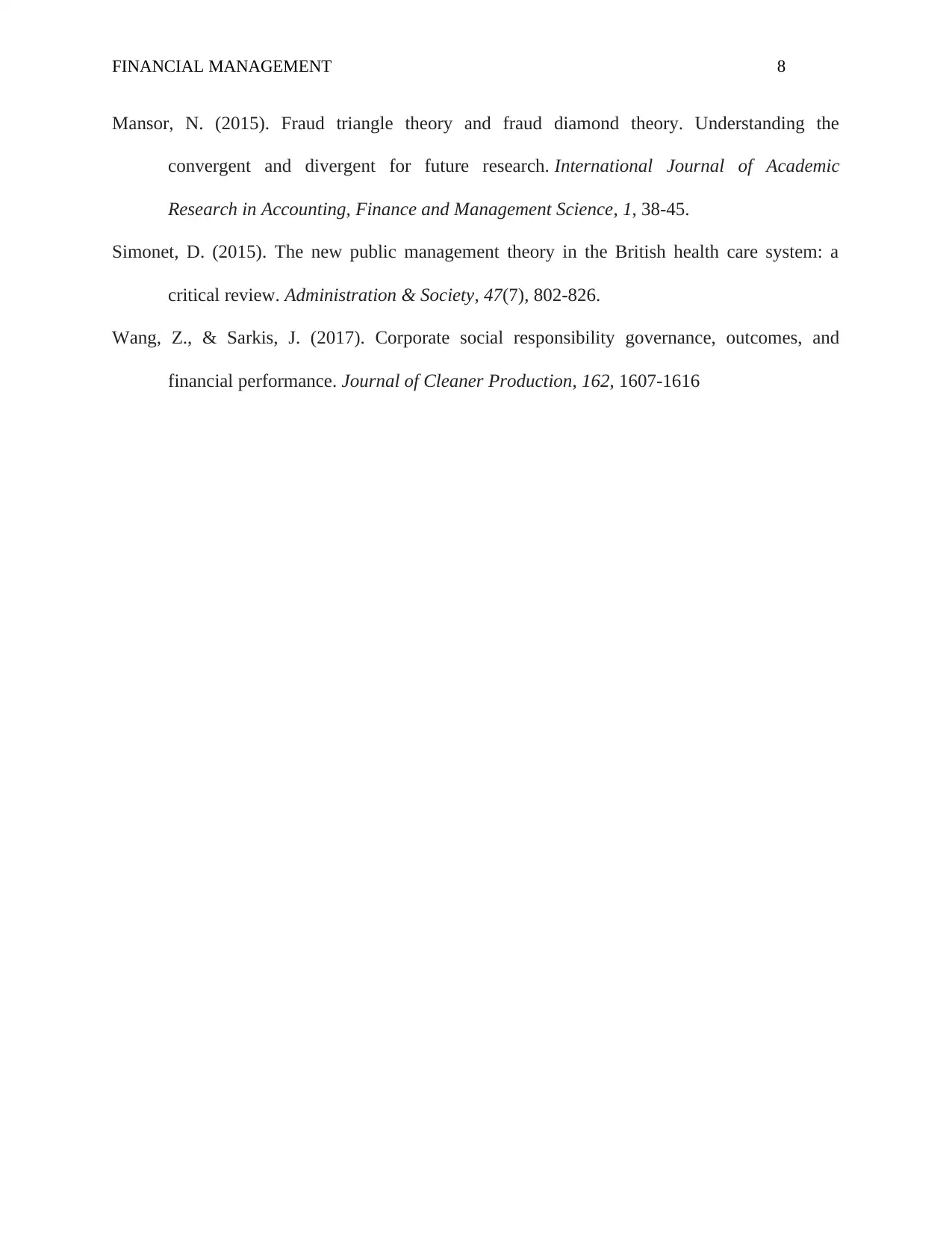
FINANCIAL MANAGEMENT 8
Mansor, N. (2015). Fraud triangle theory and fraud diamond theory. Understanding the
convergent and divergent for future research. International Journal of Academic
Research in Accounting, Finance and Management Science, 1, 38-45.
Simonet, D. (2015). The new public management theory in the British health care system: a
critical review. Administration & Society, 47(7), 802-826.
Wang, Z., & Sarkis, J. (2017). Corporate social responsibility governance, outcomes, and
financial performance. Journal of Cleaner Production, 162, 1607-1616
Mansor, N. (2015). Fraud triangle theory and fraud diamond theory. Understanding the
convergent and divergent for future research. International Journal of Academic
Research in Accounting, Finance and Management Science, 1, 38-45.
Simonet, D. (2015). The new public management theory in the British health care system: a
critical review. Administration & Society, 47(7), 802-826.
Wang, Z., & Sarkis, J. (2017). Corporate social responsibility governance, outcomes, and
financial performance. Journal of Cleaner Production, 162, 1607-1616
1 out of 8
Related Documents
Your All-in-One AI-Powered Toolkit for Academic Success.
+13062052269
info@desklib.com
Available 24*7 on WhatsApp / Email
![[object Object]](/_next/static/media/star-bottom.7253800d.svg)
Unlock your academic potential
Copyright © 2020–2026 A2Z Services. All Rights Reserved. Developed and managed by ZUCOL.




